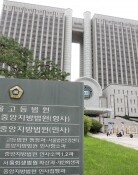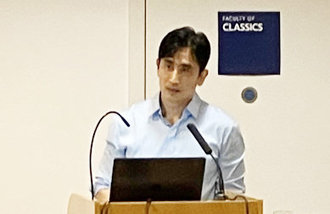Saenuri: civil servants pension without reform to pose burden on future generations
Saenuri: civil servants pension without reform to pose burden on future generations
Posted September. 23, 2014 05:47,
A public forum aimed at reforming the government employee pension foundered even without kicking off. The policy form aimed at grand reform of the Government Employee Pension, which was to be hosted by the Korean Pension Association at the main conference room of the Members Office Building at the National Assembly on Monday, was cancelled as more than 500 members of the civil servants union attended the event and caused a fuss. The starting of a process to reform the pension system to require civil servants to pay more, and be paid less has thus hit a snag.
Attendees at the forum changed the venue to a small conference room at the building, and held a closed meeting where participants exchanged views for about an hour, before dismissal. They decided to post discussions at the meeting on the associations website in the future.
As government employees organization has expressed strong objection to pension reform from the start of public debate over the issue, the ruling camp is perplexed. The reform plan is targeting not only newly appointed civil servants but also active civil servants who are paying pension premiums and those who have already retired and are receiving pension payment, in order to overcome a situation where government subsidies to the government employee pension continues to mount despite the 2009 measure to stabilize finances in the pension. Since the reform targets 1 million civil servants and their families, it faces systematic resistance. Not only ruling and opposition parties but also society as a whole have a broad consensus that the current system cannot be viable, and overcoming such move to unconditionally resist reform is the key to addressing the issue.
Insiders in the ruling camp said, A bill to reform the civil servants pension should be finalized from late this year to early next year, when no election is scheduled. But it is worried such a measure could cause the entire organization of civil servants to oppose the ruling camp. For this reason, some analysts say that the government should present additional incentives for civil servants.
Nevertheless, the government should spend more than 2 trillion won (1.92 billion U.S. dollars) to subsidize shortfalls in the civil servant pension this year alone. The Korean Pension Association predicts that the total value of such subsidies will soar to 3.289 trillion won (3.15 billion dollars) in 2015. If left unchecked, the coffers of the government employee pension will be no different from a jar with a huge hole at the bottom. In order for the pension to transform into the same structure as that of the national pension, a plan to implement reform measures beginning in 2016 but adjust them in phases is being suggested as an alternative solution.
Even if a bill to revise the government employee pension is drafted at the government level after overcoming many difficulties, it will inevitably float for a long time unless the ruling and opposition parties reach agreement at the parliamentary Security and Public Administration Committee. Since the committee is comprised of equal 11 lawmakers each from the ruling and opposition parties, it cannot be guaranteed that a bill will pass the standing committee if the National Assembly Advancement Act is applied to the bill.
Experts say that the government can prevent systematic resistance only when it involves civil servants in the discussion from the phase of drafting a reform plan. Kwak Chae-ki, professor of public administration at Dongguk University, said, Although they themselves are stakeholders to the issue, efforts are need to have people representing civil servants participate in discussions to devise a reform bill, adding, Drafting of a bill by one side and its unilateral announcement is not an appropriate approach to the issue.







